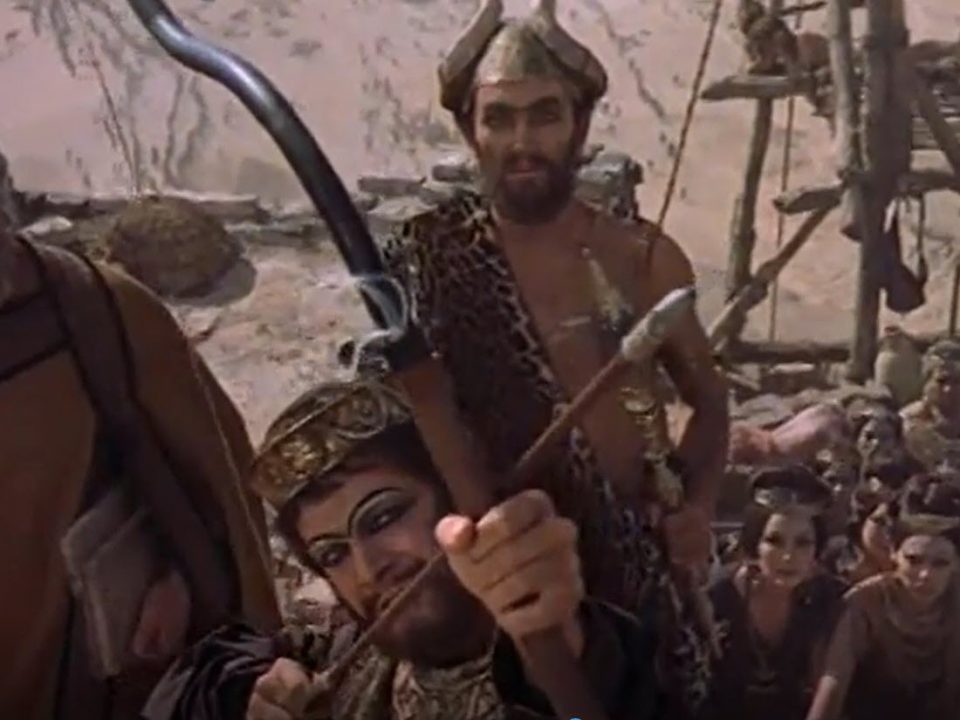A First & Last Prayer
A First & Last Prayer
 As Catholics, we know from what we’ve been taught that it was necessary for our Lord to die on the cross in order to redeem us from our sins and to open the gates of Heaven. Prior to His death, because of the sins of Adam and Eve, Heaven was “off limits” to everyone.
As Catholics, we know from what we’ve been taught that it was necessary for our Lord to die on the cross in order to redeem us from our sins and to open the gates of Heaven. Prior to His death, because of the sins of Adam and Eve, Heaven was “off limits” to everyone.
In the New Testament, the only people who were identified on Calvary where our Lord was crucified were the soldiers, some antagonists, and five other people: the Blessed Virgin Mary, St. Mary Magdalene, St. John the apostle, and the two criminals who were crucified with Jesus.
Most Catholics overlook the role the two criminals played in the final moments of our Lord’s life. Is there anything we can learn from them? If not, why was it that the Holy Spirit inspired St. Luke to record what was said by the criminals?
Here’s the information we have about the criminals who suffered the same fate as our Lord (Luke 23:33-43):
And when they were come to the place which is called Calvary, they crucified him there: and the robbers, one on the right hand, and the other on the left. And Jesus said: Father, forgive them, for they know not what they do. But they, dividing his garments, cast lots. And the people stood beholding. And the rulers with them derided him, saying: He saved others: let him save himself, if he be Christ, the elect of God. And the soldiers also mocked him, coming to him and offering him vinegar. And saying: If thou be the king of the Jews, save thyself. And there was also a superscription written over him in letters of Greek and Latin and Hebrew THIS IS THE KING OF THE JEWS. And one of those robbers who were hanged blasphemed him, saying: If thou be Christ, save thyself and us. But the other answering, rebuked him, saying: Neither dost thou fear God, seeing thou art under the same condemnation? And we indeed justly: for we receive the due reward of our deeds. But this man hath done no evil. And he said to Jesus: Lord, remember me when thou shalt come into thy kingdom. And Jesus said to him: Amen I say to thee: This day thou shalt be will be with me in paradise.
Although not much was said by the two criminals, they clearly revealed what was in their hearts by the words they spoke.
The defiant criminal challenged Jesus to prove He was God – the same way Satan challenged Him after He had fasted for 40 days. The challenge came from an evil man who was full of pride, completely self-absorbed, and unwilling to take personal responsibility for his own actions. Rather than acknowledge his own sinfulness, he lashed out at God commanding that God save Himself and the criminals.
The penitent criminal was the exact opposite. He courageously reprimanded the defiant criminal for the way he was behaving toward God. He then said one prayer – probably the first and last prayer of his entire life – “Lord, remember me when you come into your Kingdom.”
According to Bishop Fulton J. Sheen, it was at that moment that our Lord “changed the picture, and made the two thieves the symbols of the sheep and the goats, which will stand at His right and left hand when He comes in the clouds of heaven, with His then triumphant cross, to judge both the living and the dead.”
According to St. Mark (15:32) and St. Matthew (27:44), both of the criminals initially hurled insults at Jesus. What changed the heart of the penitent criminal was that he had the humility to accept the grace that emanated from Jesus. On the other hand, because of his pride, the defiant criminal had no place in his heart for our Lord’s grace.
Before anyone can manifest true courage, he (or she) must first possess humility. From an earthly standpoint, the penitent criminal had nothing to gain by verbally chastising the defiant criminal. Why speak out in defense of our Lord when they were surrounded by people who hated Christ and took pleasure in tormenting Him? By speaking out, the penitent criminal opened himself up to possible ridicule and additional physical abuse from the enemies of Christ.
I once read about how St. Maximilian Kolbe reacted any time he heard someone use God’s name in vain. He would immediately rush up to the person and plead with the person to show respect for the name of God. Even though St. Maximilian had a relatively small frame and did not have the physical strength to defend himself, he still fearlessly challenged complete strangers to honor and respect the name of God.
Now I want you to imagine something: You’re in a theatre with some friends waiting for a movie to start and you hear some punk sitting behind you repeatedly use God’s name in vain. Would you turn around and ask the person to stop offending the name of God? You probably wouldn’t, because of fear that the person would physically harm you.
I’ll make it easier. You’re sitting with some co-workers in a fast-food restaurant like Steak ‘n Shake or Arby’s. The area where you’re sitting is a large open dining area with tables and chairs. Two tables away from where you’re sitting, there is a group of people who work for a company that is located in the same building where you work. One of the women in the other group, in a loud enough voice for everyone in the dining room to hear, uses God’s name in vain on several different occasions. The woman is obviously not a physical threat to you. Would you, in front of your co-workers and everyone else in the restaurant, stand up and walk over to the person and ask her to refrain from using God’s name in vain?
The primary reason you probably wouldn’t challenge her is because you are more concerned with the opinions of your co-workers and the other people sitting in the restaurant than you are with doing what you know our Lord would want you to do. It is because of your pride (and other lesser important reasons) that you would refrain from defending the name of your Savior.
It was pride (along with fear that he could lose his position as governor) that preceded the decision of Pontius Pilate to turn our Lord over to His murderers. It was pride (along with fear that he would be arrested) that prompted Peter to deny our Lord three times. It was pride (along with fear) that kept all of our Lord’s apostles, except for St. John, away from Calvary. Pride always precedes worldly fear.
It was humility (along with love and courage) that brought our Lady, St. Mary Magdalene, and St. John to the foot of the cross. It was humility (and love) that preceded Veronica’s bold and courageous act of disregarding the orders of the soldiers and approaching our Lord (while he was struggling to carry His cross) to wipe the sweat and blood from His face. It was humility (and courage) that prompted the penitent criminal to come to our Lord’s defense. Humility always precedes true courage. It is not enough to love. It is not enough to have faith. All of the apostles except Judas loved our Lord, but only one had the humility and courage to risk his life by standing in the midst of our Lord’s enemies.
The penitent criminal didn’t get a free pass into heaven. He earned it through his humility, courage, faith and love. You and I aren’t going to get a free pass either. We’re going to have to earn heaven by travelling the same path that the penitent criminal (finally) traveled: humility, courage, faith and love.
We will never be able to share in our Lord’s Resurrection unless we’re willing to first share in His Crucifixion. Sharing in His Crucifixion begins with humility. That’s why we must pray for humility every day, before we pray for anything else.
On this Easter Sunday, we can all look forward to our own Resurrection and the welcome we will receive in heaven from our Lord, our Lady, St. John the apostle, and even that criminal who had the humility to accept our Lord’s grace and stand up for His name. Today really is a glorious day.




1 Comment
[…] discuss the virtue of humility and the importance of praying for humility. The first article — A First & Last Prayer — describes how the virtue of humility saved one of the two criminals who was crucified with […]